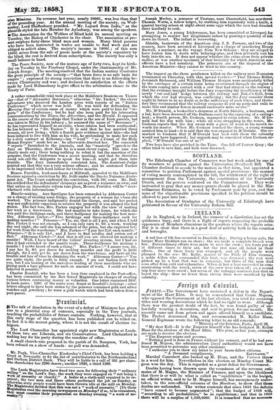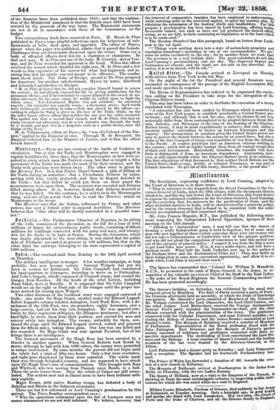lump nut( Cullum!.
cfraurt.—The Government have sustained a defeat in the Depart- ment of the Haut Rhin. It may be remembered that Count Migeon, who opposed the Government at the last election, was tried for assuming titles and wearing decorations which he had no right to wear. Although there was the greatest doubt of the fact, he was found guilty of Un- lawfully wearing a decoration, and sent to prison for one month. He recently came out from prison and again offered himself as a candidate. The Prefect denounced him, and recommended M. Keller Haas, General Espinasse wrote the following letter to an old comrade.
"Ministry of the Interior, Paris, April 28. "My dear Koll—It is the Emperor himself who has designed M. Keller Haas for the electors of the Haut Rhin. This year, as last year, attempts are made to deceive the electors.
"The Emperor reigns and _governs.
"Nothing good is done in France without his cement, and if he had pre- ferred M. Migeon, the administration (local authorities) would not have been_permitted to patronize any other candidate.
"I authorize you to show my letter to your brave fellow citizens. "A thousand compliments, EsrrNessz." Marshal Canrobert also backed up K. Haas, and the Univers threw in a word for him. Nevertheless in the election on Monday Count Mi- geon won the day. This is regarded as a great defeat for Government.
Doubts having been thrown upon the soundness of the revenue esti- mates of K. Magne, the Minister of Finance and upon the likelihood that there is or will be what is called an " eqUilibrium " in the biandat an official writer, said to he K. Magne himself, has anonymously taken, in the non-official columns of the Moniteur, to show that these doubts are unfounded. The writer contends that since 1855 the deficits "have ceased to become augmented "; that the budget of 1858 will, "according to all probabilities," be in equilibrium ; and that in 1859 there will be a surplus of 1,920,000/. It is remarked that no accounts
of the finances have been published since 1855; and that the explana- tion of the Ministerial statement is that the deficits since 1855 have been covered by the proceeds of the war loans. The Ministerial statements are not at all in accordance with those of the Commission on the budget.
Two extraordinary duels have occurred at Paris. M. Henri de Pane published in Figaro some playful reflections upon the behaviour of sub- lieutenants at balls, their spurs and appetites. The editor of Figaro, absent when the paper was published, admits that it passed due bounds. Challenges from sub-lieutenants showered upon the writer. Some say a body of offended officers drew lots for a champion or champions. Be that as it may, M. de Pene and one of the body, M. Courtiel, met at Vesi- naY, and Be Pene wounded his opponent in the band. When this officer received the wound which disabled his right arm, M. de Perm said a few words to him expressive of his sorrow for what had happened, and as- suring him that his article was not meant to be offensive. The comba- tants shook hands. The Duke of Rovigo, second to De Pane prepared for departure, but another sub-lieutenant, Hyene by name, interfered and demanded satisfaction On the spot. "If. de Pane declared that he did not consider himself bound to renew the contest ; he had already exposed his life by giving satisfaction for the presumed offence, and if he consented to expose himself to the sword of an- other adversary for the same cause he might be called upon to fight the *hole army. Sub-Lieutenant Hyene was not satisfied ; he answered angrily; the rejoinder was equally warm ; a discussion arose; hard words were exchanged ; according to some a blow was struck by the officer—ac- cording to others he Hung a glove in the face of De Pane, while, on the the other hand, others affirm that neither the one nor the other occurred. The upshot was that a second duel ensued, and M. de Pane, who had al- ready escaped one adversary, was in a few minutes run through the body by a second, and now lies in a desperate state in a public-house, near the bridge of the Pecq." M. de Villemessant, editor of Figaro, the "son of a Colonel of the Em- pire," applied to the Emperor at once. Through M. de Mocquart, the Emperor referred him to the Minister of Justice, and to him the editor betook himself.
31/nutringrl—There are two versions of the battle of Grahovo in circulation. One is that the Turks and Montenegrins were engaged in regular hostilities for three days, that the Montenegrins at first were re- pulsed in every attack upon the Turkish camp, but that at length a false movement of the Turks was made the most of by their enemies, and the Turks with great loss were driven away. The other story is given by the Morning Post. It is that Prince Daniel framed a plan of falling on the Turks during an armistice ; that a Frenchman, Delarue by name, serving with him, vainly protested, and then in disgust deserted to the Turks ; but that before he could put them on their guard the mountaineers were upon them. The massacre was executed and Delarue killed among others. It is, however, denied that Delarue deserted or that he was killed. On the contrary, he is said to be in the Montenegrin camp, and one of his recent feats was to read the Moniteur article on Montenegro to the troops. The Moniteur says that the Sultan, influenced by France and other powers, has sent a formal order to suspend hostilities. The Honiteur believes that "this affair will be shortly concluded in a peaceful man- ner."
11If hin 1g.—The Piedmontese Chamber of Deputies, in its sitting of the 14th, commenced the discussion on the bill for a loan of forty millions of francs for extraordinary public works, consisting of fifteen millions for buildings connected with the army and navy, and twenty- five for the docks to be built at Genoa. During the discussion, which was finally adjourned to the next sitting, it was stated that the public debt of Piedmont amounted at present to 630 millions, but that on the other band the railways belonging to the state represented a capital of 1200 millions.
Snkis.—The overland mail from Bombay to the 24th April arrived on Thursday.
The military intelligence is meagre. A hot weather campaign, so long probable, has now become certain. General Walpole has put his force in motion for Rohilcund. Sir Colin Campbell had transferred his head-quarters to Cawnpore, intending to move on to Futteyghur. And Coke's brigade, chiefly composed of Punjaub troops, had crossed the
Ganges from Roorkee. All the heads a the rebel faction, including Nana Sahib, were at Bareilly. It is supposed that Sir Colin Campbell 'would act on the right or Doab side of the Ganges until the proper mo- ment arrived for closing upon Walpole.
Two other divisions of the Lucknow army were engaged eastward of Oude ; one under Sir Hope Grant, another under Sir Edward Lugard. Before LuganTs column reached Azimghur, Lord Mark Kerr, with a de- tachment of the 13th Foot, two six-pounders, eighty horsemen, and a large convoy, had cut his way into Azimghur. He was opposed reso- lutely by three regiments of Sepoys, the Dinapore mutineers; but after a hard fight, lie drove them from their position, and carried his men and convoy safely into Azimghur. The enemy, unluckily for them, con- tinued the siege until Sir Edward Lugard arrived, routed and pursued them for fifteen miles, taking three guns. Our loss was one killed and five wounded. Sir Hope Grant was sent against Fyzabad, but of his doings there is no intelligence. The forward movement of Sir Hugh Rose has been arrested by a blunder in another quarter. When General Roberts took Kotah by storm, although he had with him 1000 sabres, the enemy were permitted to escape unmolested. By some mistake the pursuit did not begin until the rebels had a start of fifty-two hours. Only a few were overtaken, and eight guns abandoned by them were captured. The rebels made their way through Scindiah's country, and are supposed to have struck upon Sir Hugh Rose's line of communications. This brought both Rose and Whitlock, who was moving from Punnah upon Banda, to a halt. There the news leaves them. Thus the rebels at Calpee are still unmo- lested. The actions near and in Jhansi seem to have been brilliant mili- tary exploits.
Major Evans, with native Bombay troops, has defeated a body of Rohillas and Bheels in the Salpoora mountains. •
' There are but few references to Lord Canning's proclamation by this arrival. The Times Bombay correspondent says-
" Why the operations consequent upon the fall of Lucknow were not sooner commenced we are not well informed. We believe, however, that
the interval of comparative inaction has been employed in endeavouring, while restoring order in the recovered capital, to quiet the country also by obtaining the submission of the leading chiefs and landholders. For thra purpose a proclamation has been issued by Lord Canning., offering terms, favourable indeed, but such as have not yet produced the desired effect, owing, as we are told, to their containing no stipulation as to the land which is to be confiscated."
The Bombay Standard has this paragraph, based on letters from Luck- now to the 1st April. "'Things were settling down into a state of melancholy propriety and regulation humdrum'—according to one of our correspondents. We pre_ sume he refers exclusively to the city ; for in another letter we read, that 'the province is in a very ticklish state. The great talookdars do not like Lord Canning's proclamations, and are shy. The dispersed Sepoys and budmashes are abroad ; and the roads are not safe in any direction. Da. coities, it is to be feared, will be rife.'" RAH tit $illitg.—The Canada arrived at Liverpool on Monday with advices from New York to the 6th May.
On the night of the 1st the President and several Senators were Serenaded in consequence of the passage of the English Lecompton Bill, and made speeches in response.
The House of Representatives has ordered to be engrossed the resolu- tion calling on the President to take steps for the abrogation of the Clayton-Bulwer treaty. This step has been taken in order to facilitate the execution of a treaty concluded with Nicaragua.
"A convention has just been ratified by Nicaragua which is asserted by some of the New York papers to establish practically a United States' pro- tectorate; and although this is not the case, since its clauses do not very materially differ from those contemplated to be adopted between Great Bri- tain, America, and Nicaragua at the time of the framing of the Clayton- Bulwer treaty, it may be made expeditiously to subserve that end, unless a precisely similar convention be drawn up between Nicaragua and this country. The arrangement in question gives the United States power not only to protect the transit between the oceans by an armed force, but also a claim to the free transport of troops and munitions of war from the Atlantic to the Pacific. It confers privileges also on American citizens settling in the country, which will in reality exempt them from all control except that of their own Government. Henceforth, therefore, the republic will have little to distinguish it from an American dependency. Annexation, how- ever' is still impracticable while the Clayton-Bulwer treaty is in existence. The first stipulation of that document is, that neither Great Britain nor the United States shall occupy, fortify, or colonize Nicaragua, or any part of Central America. To get rid of this treaty, therefore, is the grand aim."



























 Previous page
Previous page